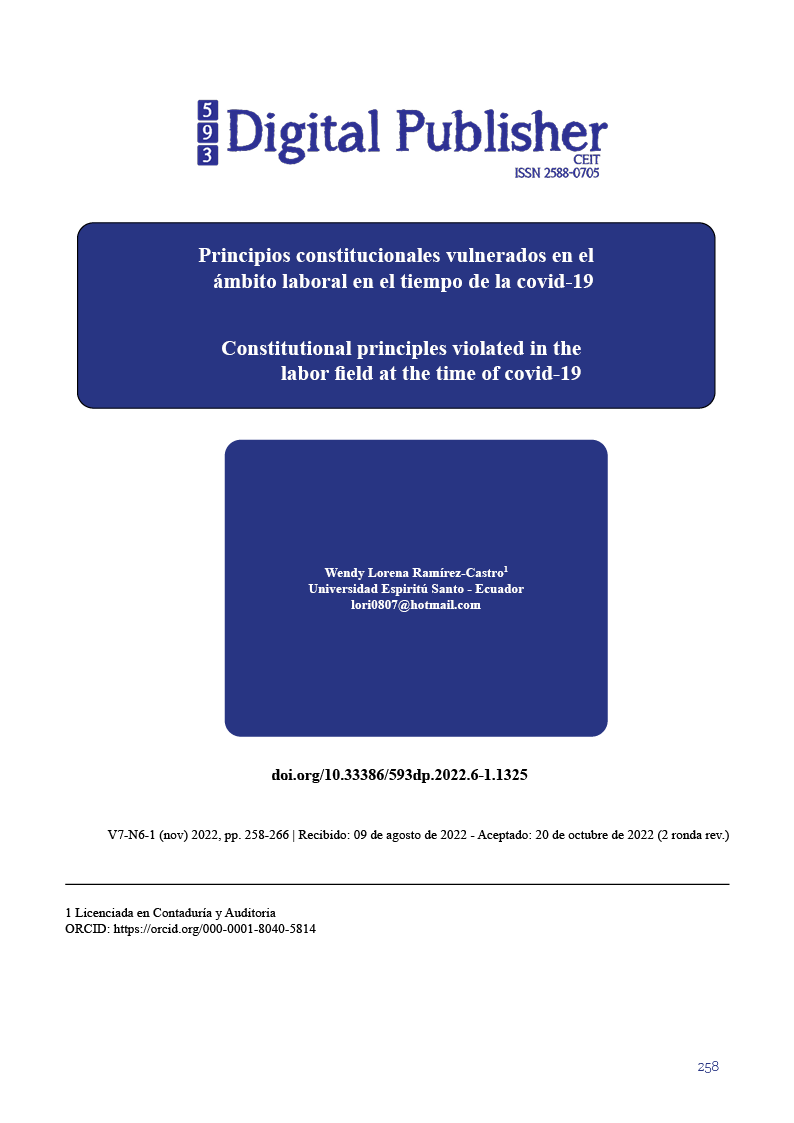Constitutional principles violated in the labor field at the time of covid-19
Main Article Content
Abstract
The unprecedented consequences of the global impact due to COVID 19 can be highlighted, resulting in a health emergency, in accordance with the provisions implemented by the countries in terms of care and containment, focusing on the validity of the protective mantle of human rights.
In the contemporary context, there is validity in the constitutional and regulatory text regarding human rights, protecting all citizens, in situations that endanger legal assets such as life, health and legal status before the spread of COVID 19; It follows that in the medium and long term the common interest, and in particular with respect to individuals and groups susceptible to violation of rights.
Downloads
Article Details

This work is licensed under a Creative Commons Attribution-NonCommercial-ShareAlike 4.0 International License.
1. Derechos de autor
Las obras que se publican en 593 Digital Publisher CEIT están sujetas a los siguientes términos:
1.1. 593 Digital Publisher CEIT, conserva los derechos patrimoniales (copyright) de las obras publicadas, favorece y permite la reutilización de las mismas bajo la licencia Licencia Creative Commons 4.0 de Reconocimiento-NoComercial-CompartirIgual 4.0, por lo cual se pueden copiar, usar, difundir, transmitir y exponer públicamente, siempre que:
1.1.a. Se cite la autoría y fuente original de su publicación (revista, editorial, URL).
1.1.b. No se usen para fines comerciales u onerosos.
1.1.c. Se mencione la existencia y especificaciones de esta licencia de uso.
References
Cabezas, V. (2020). El Covid-19 y el derecho del trabajo: Sintomatología de un modelo en emergencia. Iuris Dictio, 17.
Chiriboga, H., Jiménez, E., & Toscanini, P. (2018). EL DERECHO LABORAL COMO HERRAMIENTA POLÍTICA, UNA MIRADA HISTÓRICA. Universidad y Sociedad, 226-231.
Coka, D. (2021). El teletrabajo en tiempos de pandemia y su impacto ante la garantía de derechos en el Ecuador. Estudios del Desarrollo Social: Cuba y América Latina, 148-154.
Corte Constitucional. (2013). Sentencia No. 016-013-SEP-CC. Caso No. 1000-12-EP.
Corte Constitucional (2021), sentencia 18-21-CN/21. Casos No. 18-21-CN y 29-21-CN
Corte Nacional de Justicia. (2016). juicio laboral número 13354-2016-00395.
Cruz, J. (2020). ANÁLISIS CRÍTICO JURÍDICO DE LA RESPONSABILIDAD PATRIMONIAL ANTE LA ACTIVIDAD IRREGULAR EN LA EMISIÓN DE LAUDOS EN LOS PROCEDIMIENTOS LABORALES EN EL ESTADO DE MORELOS. UAEM.
Cruz, P. (2020). NORMATIVA LABORAL Y DE SEGURIDAD SOCIAL EN TIEMPOS DE PANDEMIA COVID-19 EN ECUADOR. Revista Iberoamericana De Derecho Del Trabajo Y De La Seguridad Social, 110-126.
González, C., & Trelles, D. (2021). Análisis de la “Ley Orgánica de Apoyo Humanitario para combatir la crisis sanitaria derivada del Covid-19” y su posible vulneración a los derechos laborales. 137-156.
Hernández, Ó. (2016). Democracia y derecho del trabajo. Gaceta Laboral, 141-180.
Horna, C., & Lobato, J. (2022). La vinculación de los trabajos que utilizan plataformas digitales a un régimen privado, bajo la aplicación del principio de condición más beneficiosa. UPAGU.
Pérez, F. (1999). Trabajo asalariado y trabajo independiente. Informe para el VI Congreso Europeo de Derecho del Trabajo.
Richter, J. (2013). El trabajo en el derecho del trabajo. Rev. latinoam. derecho soc no.16, 179-215.
Rosales, C., & Barona, R. (2021). Inaplicabilidad de los Derechos Humanos: causas y fundamentos. Revista de Estudios de la Justicia, 127-157.
Terán, S., & Ayala, D. (2020). Los efectos laborales de la pandemia del Covid-19 y el ordenamiento jurídico ecuatoriano. Revista Jurídica Del Trabajo, 52-60.


